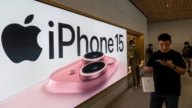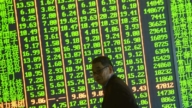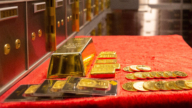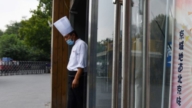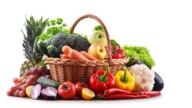【新唐人2014年04月12日讯】进入2014年以来,人民币汇率连续三个月贬值。但是人民币的连续贬值并没有给中国的出口带来利好,反而3月份进出口规模双双同比下滑。从整个第一季度来看,出口累计下降了3.4%,这是从2010年以来的首次季度负增长。一种作为中国经济龙头的出口经济出现负增长,中国经济该如何应对呢?请看报导。
中共海关总署4月10号公布的资料显示,中国3月份进出口总值3325亿2000万美元,同比下降9%。其中,出口下降6.6%﹔进口下降11.3%。
如果按人民币计价,进出口、出口、进口同比分别下降11.5%、9.2%和13.8%。
2月份的海关统计资料,按美元计价出口下降18.1%﹔进口增长10.1%,进出口总额下降4.8%。
连续两个月的负增长,使得一季度累计出现了负增长。
大陆《国情内参》杂志首席研究员巩胜利认为,中国出口下滑一方面是受到了国外形势的影响。他表示,由于美国退出宽松货币政策(QE),全球新兴的24个国家都受到了影响,中国也不例外。
巩胜利推测,中国经济更严峻的应该是在第三季度,因为那时美国将终结QE。
巩胜利表示,在中国国内从能源到交通等等费用也都在增加,经济运行成本也是越来越高。
中国《国情内参》首席研究员巩胜利:“因为中国现在有一点,中国政府的运行目前全球是之最的。就是包括政府的开支,政府的中间环节,还有政府对企业运行的费收之高,都是全球主要国家里面最高的。”
巩胜利指出,目前进出口都开始萎缩是必然的结果。如果中共政府不对经济运行成本作出有效调整,往后中国的经济还要严峻的多。
中国经济学者段绍译:“特别是中国的计划生育搞了这么多年,使很多的廉价劳动力越来越减少,劳动力的成本现在这几年增长是非常大的,所以这些简单的靠劳动力气出口的企业确实失去了他们的竞争力。”
中国经济学者段绍译表示,中共政府干预进出口的政策误导了市场,不能使有优势的企业产品出口,也不能使其他国家有优势的产品进口,破坏了正常的国际贸易模式。
英国“汇丰银行”驻北京经济学家马晓萍,对美国《华尔街日报》表示:国内外需求持续疲弱,中国主要交易伙伴国经济复苏程度不及预期。几乎可以肯定,中国一季度经济增速不及去年四季度。
而“苏格兰皇家银行(RBS)”的首席中国经济学家高路易(Louis Kuijs)在一份报告中指出:这样的出口资料,会加大政策层和市场对经济大幅放缓、中国失去竞争力的担忧。
但高路易(Louis Kuijs)认为,可能中国的经济没有资料那么糟,为让更多的资金流入中国,一些企业虚报出口货值。他测算,去年(2013年)3月份中国的出口同比增幅,被夸大了11.8个百分点。
其实,3月进出口资料一公布,中国股市立即下跌,“恒生中国企业指数”(Hang Seng China Enterprises Index)已下跌1.3%。
而中共政府也在4月初出台了“微刺激”计划,想通过减免小企业税等措施,来推动经济增长。
中共总理李克强日前也表示,中共政府将加快在铁路和保障房建设方面的投资。
这都反映了当局对经济的担心。
段绍译认为,政府主导的经济模式应该叫停了:政府干预汇率,造成不应该出口的出口,不该进口的进口﹔而政府管制土地,则导致房子拆了建,建了拆,房价泡沫也越来越大。
段绍译:“像一些不该出口的减少出口,该进口的增加进口,房子的泡沫早一点破灭。虽然早期虽然我们会看到经济萧条,我们会看到就业机会会减少,市场没有那么繁荣,但是长期来讲是一个理性的回归。”
段绍译指出,中国目前这种发展模式,只会对中国国内的资源浪费越来越严重,对未来只有害处没有好处,是到了调整的时候了。
采访/易如 编辑/宋风 后制/孙宁
China Exports Fell And The Economy Weakened
Chinese RMB experienced a three month fall in 2014.
The devaluation of RMB brought contraction in both imports
and exports in March.
In the first quarter, Chinese exports fell by 3.4%, the first drop
since 2010.
How should China react to the falling exports, its economic leader?
The following is our report.
The Communist Customs data on April 10 showed that China’s
total import and export was US$ 332.5b, 9% down year-on-year;
that is a 6.6% drop in exports, and 11.3% fall in imports.
In RMB, that’s equivalent to 11.5% (import & export),
9.2 % (export) and 13.8 % (import) fall.
Customs February data showed exports fell by 18.1%;
imports increased by 10.1%,
total imports and exports decreased by 4.8 %.
The accumulative data gave a total negative growth for the first
quarter of 2014.
Chinese finance think-tank researcher Gong Shengli believes
that the decline in exports was affected by the global situation.
He said that 24 emerging countries, including China, are all
affected by the United States withdrawal from the monetary
policy, quantitative easing (QE).
Gong Shengli speculated that the Chinese economy should be
more severe in the third quarter when QE ends.
Gong Shengli indicates that costs have been increasing in mainland,
from energy, transportation, to operations.
Gong Shengli, Chinese finance think-tank researcher:
“In particular, the Communist government is running the highest
operating costs in the world.
From the expenditure of the government to the charges to
industry, the Communist regime is the highest."
Gong Shengli notes the import-export contraction in China is
inevitable.
If the regime fails to conduct effective adjustment of economic
operation costs, China’s economy will only get more severe.
Duan Shaoyi, economist: “Years of Chinese family planning
have largely reduced labor.
The cost of labor has taken big leap.
Industries relying on cheap labor have actually lost their
competitiveness."
Economist Duan Shaoyi explains that the regime policy in the
import and export field has misled the market, discouraged products
of advantage from either imports or exports, and totally
disobeyed the rules of international trade.
WSJ quoted Ma Xiaoping, a Beijing-based economist at HSBC,
“Internal and external demand remain weak", and that
the recovery of China’s major trade partners wasn’t as good as
expected.
“It is now all but certain that China’s growth in the first quarter
was slower than in the final quarter of last year", Ms. Ma added.
WSJ also reported, that “While the export data will add to
worries among policymakers and in the market about growth
slowing down precariously or China losing competitiveness,
we would caution against such interpretations", said RBS
economist Louis Kuijs in a report.
However, Louis Kuijs also noted, “Do not worry about the
export data". RBS estimates year-on-year export growth in
March 2013 was inflated by 11.8 percentage points due to
overinvoicing.
In fact, China’s stock market fell immediately upon the release
of the March customs data. Hang Seng China Enterprises Index
fell 1.3%.
The mini-stimulus plan introduced in early April was hoped
to push economic growth through tax relief for small businesses.
Chinese Premier Li Keqiang said the mini-stimulus was based
on higher spending on construction of railways, low-cost housing
and other projects.
This decision suggests the regime is concerned about the economy.
Duan Shaoyi believes that government-led economic model
should be terminated: the currency exchange rate intervention by
the regime has resulted in imports and exports that broke
the trade rules;
the land policy has resulted in numerous demolitions and
constructions which only created a bigger real estate bubble.
Duan Shaoyi: “Get the trade in a normal pattern will burst the
housing bubble quicker.
It will lead to recession, reduced employment, and a weak market,
but it will be a rational return in the long run."
Duan Shaoyi points out that the current development will only
result in more serious waste of resources, which is only
detrimental to the future.
It is time to adjust.
Interview/Yi Ru Edit/Song Feng Post-Production/Sun Ning




